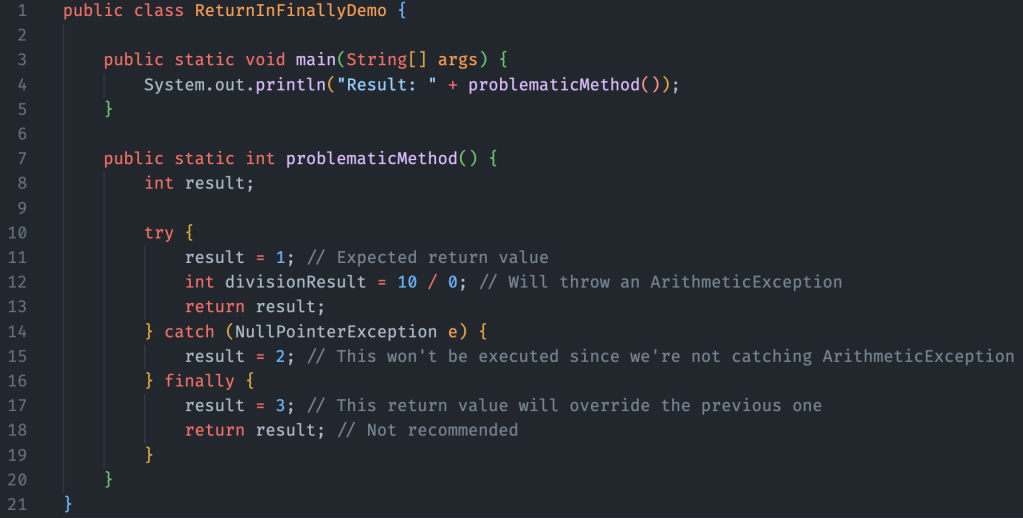Hello, dear readers! Today, we will dive into the intriguing world of Java exception handling, focusing on the use of return statements in a finally clause. While the finally block is widely used to execute code regardless of whether an exception occurs or not, the consequences of including a return statement in this block might not be immediately apparent. In this blog post, we will explore the potential outcomes and discuss the best practices for using return statements within a finally clause. So, let’s get started!
Understanding Finally Clauses
In Java, the try-catch-finally construct is used to handle exceptions gracefully. The try block contains the code that may throw an exception, the catch block handles the exceptions thrown, and the finally block is used to execute code regardless of whether an exception is thrown or caught. This makes the finally block an ideal place to perform cleanup tasks, such as closing resources or releasing locks.
Can We Have a Return Statement in a Finally Clause?
Yes, you can include a return statement in a finally clause. However, doing so may lead to unexpected behaviour and is generally considered poor practice.
What Will Happen if We Have a Return Statement in a Finally Clause?
If you include a return statement in a finally clause, the following consequences may occur:
- Overriding of prior return values: If a return statement exists within the try or catch block, the return value from the finally block will override it. This can lead to unexpected results, as the original return value may be lost.
- Suppression of exceptions: If an exception is thrown within the try or catch block but not caught, a return statement in the finally block will suppress that exception. This is because the method will return a value instead of propagating the exception up the call stack.
Best Practices for Using Return Statements in a Finally Clause
Given the potential consequences of including a return statement in a finally clause, it is generally recommended to avoid doing so. Instead, consider the following best practices:
- Keep the finally block clean: Use the finally block for cleanup tasks only, avoiding return statements or any code that could throw exceptions.
- Separate logic: If you need to return a value based on the result of the try-catch block, do so outside the finally block.
- Catch and rethrow exceptions: If you must handle exceptions within the finally block, catch them explicitly and rethrow them as necessary to ensure proper exception propagation.
Code example
public class ReturnInFinallyDemo {
public static void main(String[] args) {
System.out.println("Result: " + problematicMethod());
}
public static int problematicMethod() {
int result;
try {
result = 1; // Expected return value
int divisionResult = 10 / 0; // Will throw an ArithmeticException
return result;
} catch (NullPointerException e) {
result = 2; // This won't be executed since we're not catching ArithmeticException
} finally {
result = 3; // This return value will override the previous one
return result; // Not recommended
}
}
}
Final Note
In this blog post, we’ve explored the consequences of including return statements in a finally clause in Java. While it is technically possible to use return statements within a finally block, doing so may lead to unexpected behaviour, such as overriding prior return values and suppressing exceptions. To ensure clean and predictable code, it is best to avoid return statements in finally clauses and adhere to best practices like keeping the finally block clean, separating logic, and catching and re-throwing exceptions as needed. Happy coding!
📚 Further Reading & Related Topics
If you’re exploring Java exception handling and control flow, these related articles will provide deeper insights:
• Can You Override a Static Method in Java? Demystifying Method Overriding and Static Methods – Understand Java’s method behavior, including how static and overridden methods impact execution flow.
• Difference Between wait() and notify() in Java – Learn about thread communication mechanisms, which can be affected by improper exception handling and return statements in finally blocks.









Leave a comment